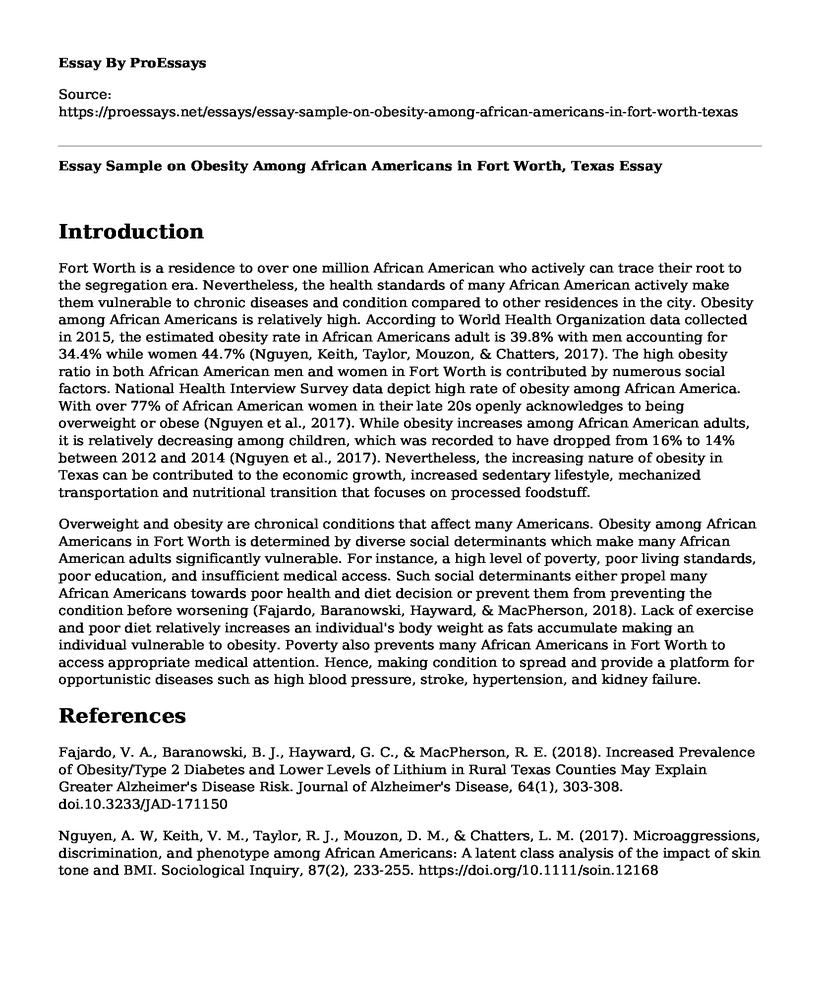Introduction
Fort Worth is a residence to over one million African American who actively can trace their root to the segregation era. Nevertheless, the health standards of many African American actively make them vulnerable to chronic diseases and condition compared to other residences in the city. Obesity among African Americans is relatively high. According to World Health Organization data collected in 2015, the estimated obesity rate in African Americans adult is 39.8% with men accounting for 34.4% while women 44.7% (Nguyen, Keith, Taylor, Mouzon, & Chatters, 2017). The high obesity ratio in both African American men and women in Fort Worth is contributed by numerous social factors. National Health Interview Survey data depict high rate of obesity among African America. With over 77% of African American women in their late 20s openly acknowledges to being overweight or obese (Nguyen et al., 2017). While obesity increases among African American adults, it is relatively decreasing among children, which was recorded to have dropped from 16% to 14% between 2012 and 2014 (Nguyen et al., 2017). Nevertheless, the increasing nature of obesity in Texas can be contributed to the economic growth, increased sedentary lifestyle, mechanized transportation and nutritional transition that focuses on processed foodstuff.
Overweight and obesity are chronical conditions that affect many Americans. Obesity among African Americans in Fort Worth is determined by diverse social determinants which make many African American adults significantly vulnerable. For instance, a high level of poverty, poor living standards, poor education, and insufficient medical access. Such social determinants either propel many African Americans towards poor health and diet decision or prevent them from preventing the condition before worsening (Fajardo, Baranowski, Hayward, & MacPherson, 2018). Lack of exercise and poor diet relatively increases an individual's body weight as fats accumulate making an individual vulnerable to obesity. Poverty also prevents many African Americans in Fort Worth to access appropriate medical attention. Hence, making condition to spread and provide a platform for opportunistic diseases such as high blood pressure, stroke, hypertension, and kidney failure.
References
Fajardo, V. A., Baranowski, B. J., Hayward, G. C., & MacPherson, R. E. (2018). Increased Prevalence of Obesity/Type 2 Diabetes and Lower Levels of Lithium in Rural Texas Counties May Explain Greater Alzheimer's Disease Risk. Journal of Alzheimer's Disease, 64(1), 303-308. doi.10.3233/JAD-171150
Nguyen, A. W, Keith, V. M., Taylor, R. J., Mouzon, D. M., & Chatters, L. M. (2017). Microaggressions, discrimination, and phenotype among African Americans: A latent class analysis of the impact of skin tone and BMI. Sociological Inquiry, 87(2), 233-255. https://doi.org/10.1111/soin.12168
Cite this page
Essay Sample on Obesity Among African Americans in Fort Worth, Texas. (2022, Mar 23). Retrieved from https://proessays.net/essays/essay-sample-on-obesity-among-african-americans-in-fort-worth-texas
If you are the original author of this essay and no longer wish to have it published on the ProEssays website, please click below to request its removal:
- Issues in Social Work and Ways to Potentially Solve the Issues
- Intercultural Learning, Global Health, and Nursing: Teaching and Learning Strategies
- Assignment Example on Medical Ethics
- Essay Sample on Over-Diagnosis: When Early Detection Can Do Harm
- 700,000 Social Workers: Standing Up for Human Rights & Promoting Justice - Essay Sample
- Paper Example on Physical Assessment: Palpatory Skills For Musculoskeletal System
- Report Example on Barcode Medication Administration







